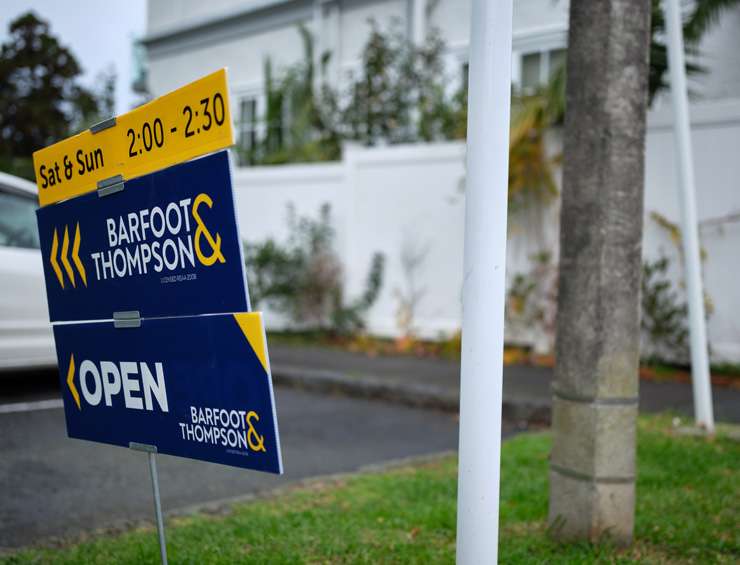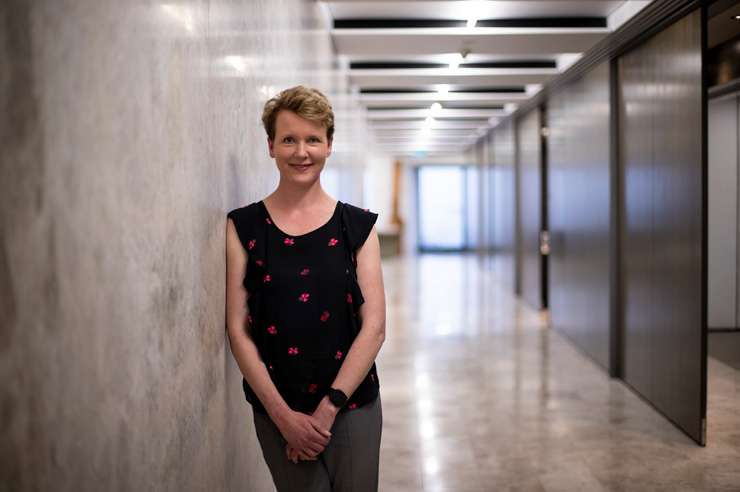CCCFA U-turn: Will first home buyers respond?
The Government's changes to the Credit Contracts and Consumer Finance Act (CCCFA), which come into effect on July 7, aren't going to make a huge difference to the housing market, say economists.
The CCCFA is designed to protect consumers from predatory lending but the tweaks the Government made to the legislation at the end of last year put the squeeze on mortgage applicants.
Tales of Kmart and coffee purchases torpedoing mortgages dominated the headlines at the start of the year as banks were forced to apply strict criteria to home loan applicants. The uproar from home-buyers, mortgage brokers and others was strong as mortgage-lending fell off a cliff.
Start your property search
The Commerce & Consumer Affairs David Clark backtracked earlier this year and promised to make it easier for first home buyers to get finance.
However, the changes announced last week haven't been as far-reaching as some would like. Kiwibank chief economist Jarrod Kerr described the tweaks to the CCCFA as mild. “The fact is [banks] still have to go through income and expenses with a fine tooth comb,” he says.
Infometrics economist Gareth Kiernan says the Government gave the impressions that it wasn't unhappy with the unintended consequences of last year's amendments to the CCCFA. “I think overall, it sort of suited the Government that some of the froth was taken out of the housing market,” he said.
The Government wanted to cool the housing market and the CCCFA "really did help to knock the stuffing out of the market", he said.
“Nine or 12 months ago, people were worried about missing out on properties. Now that sentiment is very much more around they're worried that they're overpaying. Ironically, the CCCFA seems to have had a bigger effect than some of the other [Government] changes, which were more directly aimed at the housing market.”

Kiwibank chief economist Jarrod Kerr says the July changes to the CCCFA are mild. Photo / Fiona Goodall
Some of the banks’ interpretation of the rules, such as viewing KiwiSaver contributions as expenses, were “clearly silly”, says Kiernan, and giving the banks more flexibility makes sense. “The banks fully realise that people will generally change their spending behaviour if they've got repayment obligations. If you're saving for a house deposit, it doesn't really matter if you want to spend some of your savings on going out to dinner. Whereas if you're going to default on your mortgage, it's a little bit different.”
House prices: Are we looking at a soft landing?
Few can deny that house prices are on their way down from the lofty heights of last year.
Predictions of exactly where the slide will end differ, as ANZ chief economist Sharon Zollner pointed out in her latest housing market report.
ANZ has downgraded its house price outlook “a touch” and is now predicting an 11% fall over 2022. “House price forecasts vary across forecasters, but are all different shades of the same soft landing,” Zollner says. ANZ predicts house prices will bottom out at just over 28% above pre-pandemic levels, while the Reserve Bank thinks the bottom will be 32% above pre-pandemic levels and the Treasury is opting for the bottom to be 36.4% above pre-pandemic levels.
House price expectations, as opposed to house prices, have also taken a hit. In their Housing Confidence report, ASB economists said that the percentage of Kiwis expecting house prices to keep rising over the coming 12 months has slumped from a net 49% in the first quarter of 2022 to a net 11% now. “The surprise, if anything, is that net housing confidence expectations are still positive. We expect at least another 12 months of falling house prices. During the last decent house price shake out in 2008, housing confidence plumbed lows around -50%.”

Real estate signs in Auckland. House price confidence across the country has taken a knock. Photo / Fiona Goodall
The ASB economists add: “It’s still far from a happy hunting ground for would-be home buyers. Just 9% of those surveyed say it is currently a good time to buy a house, compared to 29% suggesting it’s a bad time (51% say neither and 10% don’t know).” That’s the lowest buyer sentiment reading for 15 years.
Adding to the housing market’s woes is the growing unease within the residential construction sector.
The most recent ANZ business outlook survey found that confidence in the residential construction sector has fallen sharply with a net 50% of firms expecting things to worsen next year. Commenting on the survey results, Westpac’s economists said: “That degree of pessimism is striking when you consider the home building industry is facing its highest demand in decades. More than 50,000 new homes have been consented over the last year, easily the highest on record – although when scaled to the size of the population, that takes us back to where we were in the mid-1970s.”
Westpac acting chief economist Michael Gordon says the key constraints are around the cost and availability of building materials. “Quotable Value reports that prices alone for materials have risen more than 20% in the last year.” That may stop New Zealand building as many homes as it needs to catch up with demand.
Mortgage rates: Is it worth fixing now?
The Reserve Bank of New Zealand is set to make another announcement on the Official Cash Rate on July 13. The RBNZ pushed the OCR up 0.5 percentage points to 2% at its last announcement in May, and although it’s not clear whether another big hike is being lined up for July, the RBNZ has signalled there will be rate rises, with economists forecasting a peak of 3.5%. Future hikes won’t necessarily mean home owners’ mortgage rates will go up by the same amount or at the same time. In fact, they didn’t rise on average over the month of May. That’s because banks had already priced in future hikes to the mortgage rates they are offering.

ANZ chief economist Sharon Zollner: “The proverbial horse has likely bolted.” Photo / Dean Purcell
Zollner says that fixing mortgages now to get ahead of any further interest rate rises is unlikely to work, she says. “Although fixed mortgage rates are likely to keep rising (albeit more slowly) as more OCR hikes are delivered, the proverbial horse has likely bolted in terms of being able to get in ahead of rises,” she says.
“All borrowers need to arrive at their own judgements regardless of our forecasts, but it’s a mathematical fact that shorter-term fixed mortgage rates will need to rise a long way before it becomes financially worthwhile to fix for longer.”
Likewise Westpac can’t see any real advantage in home owners fixing. “While a one-year mortgage rate is likely to rise further in the year ahead, fixing and rolling for this term is likely to produce a lower borrowing cost on average over the next few years. Longer fixed terms would be more suited to those who want certainty in their repayments.”
ASB notes that home-owners aren’t being caught out by surprise with mortgage rate rises. “The results of our [April] survey at least suggest most households can see it coming. A net 81% of those surveyed expect interest rates to keep rising over the coming 12 months – a fresh 26-year high.”
Inflation and the Big R
Rising petrol prices have forced the ANZ to tweak its inflation forecasts. The bank’s economists had previously said that inflation running at 6.9% for January to March this year was “going to be the worst of it”, but they now think more pain is on the horizon.
“Volatility in oil prices has remained extreme in the wake of the Russian invasion of Ukraine, and subsequent efforts from the EU to ban the import of Russian oil. Add NZD weakness against the USD to the mix, and that’s sent petrol prices almost back to where they were when the Government announced the temporary reduction in the fuel excise tax. Given those moves, it’s looking much more likely that inflation will peak in [April to June] , at around 7%.”
The RBNZ’s quest to squash inflation is without cost, ASB’s economists say. “The question is not whether the RBNZ will eventually get on top of inflation, but more what will need to be sacrificed to get there.”
The results of ANZ’s latest Business Outlook survey, and its implications for the economy, get a mention by most of the main banks’ economists, with Kiwibank calling it a “rude surprise”.
BNZ’s senior market strategist Jason Wong said it painted a “bleak picture” of the New Zealand economy. “Other indicators [are] also consistent with a sluggish economy. When combined with the recessionary level of consumer confidence, and the slumping housing market, the signs of an economic recession, or thereabouts, are clearly visible.”
BNZ’s Stephen Toplis says the RBNZ may be “confident” that the New Zealand economy can avoid a hard landing, but his economists are not so. “Our forecasts contain just a modest recession, but the risks of something much deeper are rising by the day,” Toplis said on May 31. “Out of the frying pan, into the fire,” says ASB chief economist Nick Tuffly about the economy. “NZ is facing the fiery heat of inflation and the RBNZ’s response to it.”














































































